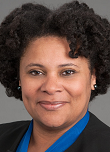Bridging The Chasm Between The Haves And The Have-Nots In Cancer Trials
By Edith A. Perez, M.D., Mayo Clinic College of Medicine, and Karen Winkfield, M.D., Ph.D., Wake Forest Baptist Health

The current COVID-19 pandemic is amplifying how the social determinants of health (SDOH) impact access to healthcare in the United States. Lack of insurance, being underinsured, having limited education or transportation, living in a rural community — these are just a few SDOH that significantly impact healthcare and outcomes in this U.S. This pandemic also highlights the importance of understanding how different populations may respond to a disease (e.g., children appearing to be at lower risk for serious COVID-19 illness), testing, and/or treatment. Clinical trials are the most important and reliable means available to provide scientific evidence for developing therapies and effective care management for patients. It is therefore essential to achieve diverse participation in clinical trials in order to ensure medical advancements — whether for testing or treating COVID-19 or for cancer therapeutics — are applicable to all populations.
Importance Of Increasing Diversity In Clinical Trials
Despite a 29 percent decline in total U.S. cancer deaths since 1991, not everyone has benefited equally from the advances in prevention, early detection, precision medicines, and targeted cancer treatments that have contributed to improved outcomes. Across most diseases, clinical trial participation tends to be quite low overall, but there is a significant lack of inclusion of racial/ethnic minorities. According to the FDA, only 4 percent of cancer clinical trial participants are black, 4 percent are Hispanic, and 15 percent are Asian, despite the fact that racial/ethnic minorities have the highest mortality rates and shortest overall survival rates for most cancers. The reasons for lack of participation are myriad, but language and cultural barriers, lack of access to clinical trials, fear and delays in seeking healthcare are significant deterrents, as are concerns about financial toxicity — including costs of treatment and ancillary costs such as travel and time off work.
Lack of diversity in clinical trial participation raises the possibility that study results may not fully apply to every patient. It is therefore imperative for institutions engaging in scientific research to design their research enterprise in a way that emphasizes and is inclusive of diverse participation. Biologic differences that impact metabolism and the efficacy or tolerability of drugs may vary among different racial/ethnic populations. Diversity is critical for cancer clinical trials in order to optimize outcomes and reduce waste in the healthcare system by treating patients with therapies that are most effective for them. If certain populations are excluded from clinical research, the full impact of any new treatment is not truly known.
Stand Up to Cancer (SU2C) recently conducted a social media analysis that found that lack of awareness, coupled with fear and anxiety, are deterrents for clinical trial participation among all population groups, and that some of the biggest barriers to clinical trial participation for both African Americans and Hispanics specifically are the cumbersome enrollment process and anticipated costs.
Another SU2C study conducted in 2018 found that that two-thirds of African American and Hispanic cancer patients surveyed were offered no information about clinical trials by their cancer care team, and most were not being treated where clinical trials are conducted. However, when asked if they would be willing to participate in a cancer clinical trial, white/Caucasian respondents were the least likely at 51 percent, Asians most likely at 100 percent, and black/African-American and Hispanics indicated a similarly high likelihood at 62 percent and 68 percent, respectively. The results of these studies highlight the importance of engaging patients from all backgrounds in research and seeking to understand their unique concerns related to clinical trial participation.
To address this issue, earlier this year, SU2C announced an initiative aimed at increasing diverse participation in cancer clinical trials by requiring all grant proposals to the organization to include three key components related to health equity: 1) an indication of whether their research will include populations expected to benefit from widespread use of any newly developed treatments, 2) recruitment and retention plans for the inclusion of historically underrepresented racial and ethnic populations, and 3) a letter of support from the lead institution’s chief diversity officer (or an equivalent position). Researchers requesting funds from SU2C will need to demonstrate well-defined recruitment/retention plans, as well as a system of accountability, to combat barriers that may hinder access for traditionally underserved populations as part of their proposals.
Focus On Community-Based, Multidisciplinary Approaches
One significant barrier to diverse clinical trial participation is location. People tend to seek cancer care close to where they live; in fact, 80 percent of cancer patients are treated in the community setting, not at large academic institutions. Therefore, building research capacity in the community care setting is critical to increasing clinical trial availability. Access to timely and accurate information related to cancer care and clinical trials is also important. This is particularly important for racial/ethnic minority populations that have been disenfranchised or even abused in the past by the U.S. healthcare system.
Taking a community-based approach to identify and dispel myths is a critical step needed to build capacity to educate and navigate populations along the cancer continuum, including cancer treatment and clinical trials. Understanding how different racial/ethnic groups discuss cancer and cancer research is essential when attempting to develop public awareness campaigns or designing materials intended to educate patients, families, caregivers, and the health/medical community about the importance of diversity in clinical trial participation. For instance, “cancer” is a popular online topic, with over 9 million “conversations” each year; however, recruitment materials developed to educate communities about clinical trials are frequently only available in English, and most content is not developed in a manner that is cognizant of cultural nuances of different populations.
While health professionals and researchers continue to identify and explore evidence related to barriers to clinical trials, a multidisciplinary approach is needed to design and implement strategies that address health equity in a meaningful, substantive way. Importantly, the FDA and several major cancer research organizations have identified increasing diverse participation in clinical trials as a high priority. As a result, health professionals and researchers across specialties and disciplines — working both independently and collaboratively — are focused on developing evidenced-based strategies to improve clinical trial enrollment among diverse populations. These initiatives hold great promise for promoting the diversity in clinical trials that better reflects U.S. demographics and the populations these trials are intended to benefit.
Another important step toward improving diversity in clinical trial participation has been the expansion of insurance coverage by the Affordable Care Act. Studies indicate that expanded insurance has provided better access to cancer care by reducing treatment delays, resulting in faster access to potentially life-saving treatments. Additionally, legislation requiring insurers to provide coverage of routine care costs for patients who elect to participate in research helps to reduce financial burden for patients and families interested in clinical trial participation but who worry about increased out-of-pocket costs. Artificial intelligence (AI) can also be applied to real-world data to make significant gains in cancer outcomes by analyzing how different populations respond to different therapeutic regimens to create recommended treatment protocols that tailor therapy to individuals based on their specific disease and data collated from patients like them.
Despite progress that has been made, there is still more researchers and healthcare professionals can do to reduce hurdles impacting diverse clinical trial participation and level the cancer care playing field. The challenges are multifaceted and will require a redesign of how clinical trials are developed and conducted. The alternative — maintaining the status quo and allowing the broad chasm between the “haves” and “have nots” in cancer care to persist — is unacceptable. It is literally a matter of life and death.
About The Authors:
 Edith A. Perez, M.D., is the Serene M. and Frances C. Durling Professor of Medicine at Mayo Clinic College of Medicine. She also serves as chair of the SU2C Committee on Health Equity in Cancer Clinical Trials. Dr. Perez is a cancer specialist and an internationally known translational researcher. Her roles extend nationally, including group vice chair of the Alliance for Clinical Trials in Oncology and other positions within the American Association for Cancer Research, the American Society of Clinical Oncology, and the National Cancer Institute. Dr. Perez has authored more than 700 research articles in journals, books, and abstracts and is invited frequently to lecture at national and international meetings. She also serves on the editorial boards of multiple academic journals.
Edith A. Perez, M.D., is the Serene M. and Frances C. Durling Professor of Medicine at Mayo Clinic College of Medicine. She also serves as chair of the SU2C Committee on Health Equity in Cancer Clinical Trials. Dr. Perez is a cancer specialist and an internationally known translational researcher. Her roles extend nationally, including group vice chair of the Alliance for Clinical Trials in Oncology and other positions within the American Association for Cancer Research, the American Society of Clinical Oncology, and the National Cancer Institute. Dr. Perez has authored more than 700 research articles in journals, books, and abstracts and is invited frequently to lecture at national and international meetings. She also serves on the editorial boards of multiple academic journals.
 Dr. Karen Winkfield is the director of the Office of Cancer Health Equity at Wake Forest Baptist Health and a member of the SU2C Committee on Health Equity in Cancer Clinical Trials. She has authored multiple papers on cancer-related cardiotoxicity, non-Hodgkin’s lymphoma, multiple myeloma, and breast cancer. She is a member of the American Society of Clinical Oncology and the American Society of Therapy Radiation & Oncology and is a board-certified radiation oncologist.
Dr. Karen Winkfield is the director of the Office of Cancer Health Equity at Wake Forest Baptist Health and a member of the SU2C Committee on Health Equity in Cancer Clinical Trials. She has authored multiple papers on cancer-related cardiotoxicity, non-Hodgkin’s lymphoma, multiple myeloma, and breast cancer. She is a member of the American Society of Clinical Oncology and the American Society of Therapy Radiation & Oncology and is a board-certified radiation oncologist.
